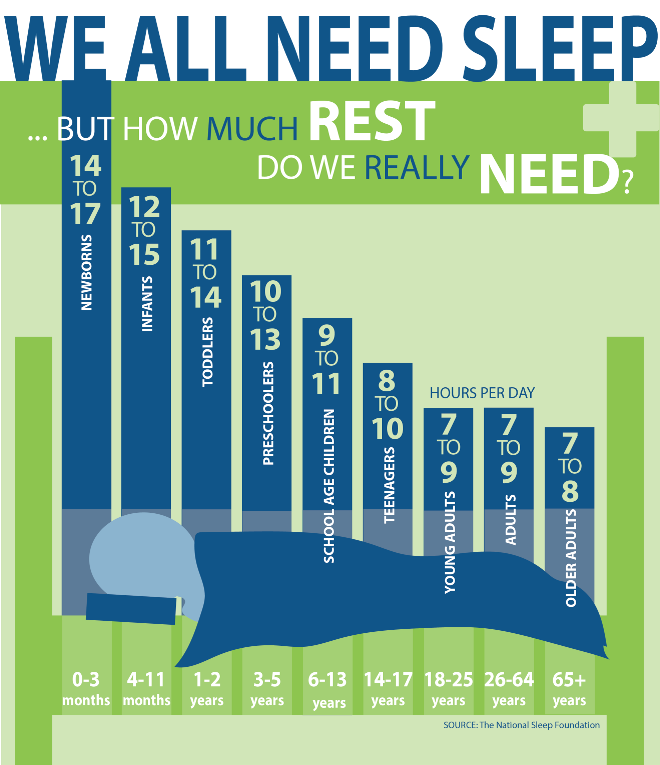How Much Rest Do Kids (& Parents) Need?
You know how it feels when you don’t get a good night’s sleep. You’re sleepy, you can’t quite get motivated to focus on what you are doing – no matter how much caffeine you drink – and you are likely irritable, too. For children heading back to school, not getting enough sleep can definitely start the school year off on a negative note.
With back-to-school time upon us, parents and children need to get back into good routines including going to bed early enough and waking up at a set time. For some children, it can take two weeks to re-adjust to a different sleep schedule, so don’t wait until the last minute to start reinforcing bedtimes.
NOT TIRED? OH REALLY!
Moms and dads have heard this excuse way too often at bedtime: “… but I’m not tired!” Usually said in an extremely whiny voice – and possibly with tears, this is every parent’s warning sign that it is time for lights out for your child.
The little ones may not understand why they need to get enough rest each day, but even those of us who are older forget how important sleep is for our bodies to continue to function as they should.
During sleep, your body gets a chance to rest and renew itself, which is critical to good health. Here are just a few things happening when you sleep, according to the National Sleep Foundation:
- Cerebral spinal fluid is pumped more quickly throughout the brain while you sleep, whisking away waste products that brain cells make.
- Your heart works hard during the day, so at night during non-REM sleep it takes some pressure off itself by reducing heart rate, as well as blood pressure.
- When you’re awake, your breathing patterns vary greatly – faster when excited, harder while exercising, etc. During sleep, your breathing slows down and becomes very regular, which improves lung function.
- While you sleep, your body releases growth hormones that rebuild muscles and joints.
NOT GETTING ENOUGH REST?
How do you know if your family isn’t getting enough rest? Moms and dads may feel like they are dragging themselves through water while children may be argumentative, but there are other indicators to be on the lookout for, according to www.sleep.org.
The symptoms of insufficient sleep in children vary among age groups:
Babies and Toddlers:
- May be cranky or fussy, especially in the late afternoons
- Act clingy
- Display hyperactive behavior
- Have trouble taking turns
- Are not talkative
- Fall asleep after being woken up
- Want to nap during the day
- Fall asleep during short car rides
- Snore
Elementary Schoolers:
- Can be hyperactive
- Fall asleep at inappropriate times
- Need to be woken in the morning multiple times
- Lack alertness, motivation and an attention span
- Seem drowsy
- Have academic struggles
- Have trouble falling asleep
- Fall asleep during short car rides
- Experience night terrors/sleepwalking
- Need regular naps
- Exhibit loud snoring, breaks in breathing or extreme restlessness at night
- Have anxiety about being separated from you
Preteens and Teens:
- Can be extremely difficult to wake in the morning
- May be chronically late
- Experience mood swings
- Have trouble concentrating
- Feel unmotivated
- Act irritable in the early afternoon
- Fall asleep easily during the day
- Have academic troubles
- Sleep for long periods on the weekends
- Act hyperactive or aggressive
- Act nervous
- Consume excessive amounts of caffeine
- Use drugs
- Seem out of it or confused
There are recommendations for the appropriate amount of sleep for each age group; however, listen to your instincts and pay attention to what you see in your children and yourself as you set the bedtime guidelines.
HELP IS HERE
If you are trying to establish a better bedtime routine – for your child or for yourself, consider the following:
- Ease into a new sleep schedule to maintain healthy sleep habits. For about two weeks, every night set an incrementally earlier bedtime, and every morning, an incrementally earlier wake-up time.
- Maintain a consistent sleep schedule.
- Don’t use the weekend to catch up on sleep.
- Create a relaxing bedtime routine. Start a quiet time to allow time to unwind.
- Limit television, video games and other electronic distractions before bedtime.
- Avoid big meals close to bedtime.
- Avoid caffeine – sodas and other caffeinated drinks should be limited after noon.
- Create a peaceful bedroom environment – dark room, comfortable bed and a room temperature that is neither too hot nor too cold.
- Set a good example for your child by keeping a regular sleep cycle.
Make their day and yours better by giving your family a boost by creating a better sleep cycle. You will all be rested and refreshed and ready to take on the day ahead!

